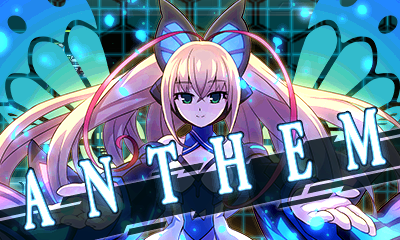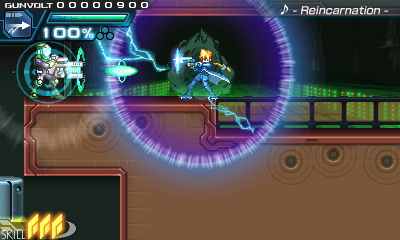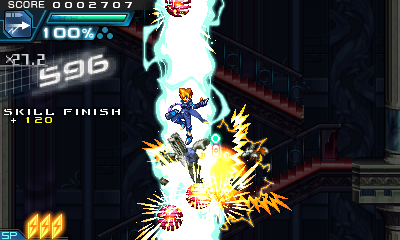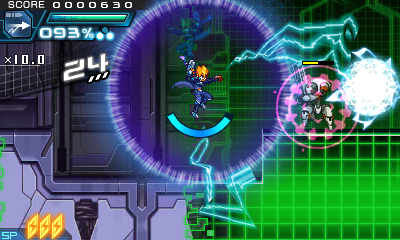Today, Hiroki Miyazawa from the Inti Creates Gunvolt team will once again lead us all through the Gunvolt design process. If you haven’t read the first part, be sure to give it a read. And if you haven’t played Gunvolt, pick up the Gunvolt Striker Pack at retail now!
Simultaneous Strikes & Delayed Destruction
As I previously explained, with Gunvolt’s two-step means of attack (aka Tag n’ Zap), we had a clear goal in mind for how we wanted this to work. However there was the concern that if we weren’t able to clearly convey our intentions with this mechanic, we run the risk of people getting negative impressions of the game.
“The tempo sucks,” “This is too complicated,” “What a pain in the ass,” and so on, were all things we did NOT want to hear.
At that point we tasked ourselves with coming up with something new that would make this two-step attack system more fun.

The first idea we thought of was the idea of being able to take down multiple enemies at once. If you’ve played Gunvolt before, then you should know exactly what I’m talking about. Tagging a bunch of baddies and zapping them all at the same time is pretty satisfying, isn’t it?
The next idea we thought of was delaying the finishing blow on enemies. Generally speaking, when you attack an enemy you take them down right then and there. However, in Azure Striker Gunvolt, you are in control of the timing of when you unleash the finishing blow to a certain extent.
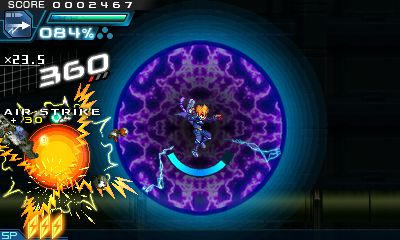
For example, one way you can make the most of this mechanic is to face an enemy eye to eye, tag them with a dart, then dash and jump over them, all the while zapping them with your electrical attacks only to finish them off when your feet hit the ground. Attacking like that with the enemy exploding behind your back kinda feels like something taken straight out of a tokusatsu (think Power Rangers and Kamen Rider) show where the hero finishes off the bad guy, right? Being able to do cool stuff like that was very much a part of our thought process.

The Kudos System and Songs
But, we didn’t think these types of gameplay elements were something the players would go out of their way to put a lot of practice into.That was the point where we began to think about implementing the Kudos scoring system.
Kudos is a type of scoring system that rewards you for exceptional play by taking down lots of enemies and the like, but we thought that just merely racking up points by beating bad guys was not quite enough. In order to rack up lots of Kudos you gotta take some risks, but at least you will look really cool while you are doing it. By doing this, we thought we would be able to encourage players to play in a more assertive, stylish way.
At the same time, with the Kudos system if you take any damage, you will completely lose all of the Kudos you accumulated. So if you are aiming to get tons of Kudos things can not only get pretty difficult, but imagine how much you’ll be sitting on pins and needles knowing that one mistake can cost you everything. After all, when you dive headfirst into an area with a bunch of enemies, instead of blazing right through you’ll want to tag them all and blast them at once for maximum Kudos. This is what we meant by “risk taking!”
But, on the other hand, we didn’t want that sort of playstyle filled with extra style points to be a necessity to play the game. We were aiming to make this game accessible to casual gamers as well, so we put a lot of importance on being able to clear the game by just defeating the enemies that stand before you without paying any sort of heed to the Kudos point you are accumulating/losing. So with that idea in mind, the truth is that if you look, you will notice that a lot of the rank-and-file-type baddies in the game don’t start attacking you immediately after they appear. Sure, taking them out from afar is the safe route, but there is something to be said about jumping headfirst into danger and really taking it to the bad guys, isn’t there?
Having said that, accumulating lots of Kudos is not really used as a means of getting some kind of reward.
If you reward high levels of Kudos with things like special items or hidden goodies, that can be quite discouraging to casual users who have little hope of obtaining those high scores.
Early on, we originally had it set so that if you start to get high amounts of Kudos, a heartbeat sound effect would play in the background…ya know, just to make you a bit more nervous. The Kudos system is really there to help boost your score and encourage fantastic, cool, bad-ass gameplay.

Eventually, we came to the profound realization that since we have a heroine character who is a singer, it would be kinda sacrilegious to NOT have her sing in the game, right?! So we went over to Ippo Yamada from the sound team and asked him to whip up a song for us. There were a lot of Kamen Rider fans amongst the development team, so it was only natural that this idea would pop up eventually. (It’s so cool how smoothly the theme song starts playing when battles begin in Kamen Rider Agito!)
So that’s how we came to have the background music change when you rack up a lot of Kudos, but we didn’t quite hit the exact result we were hoping to achieve with this feature, which was referenced by the dissatisfaction felt by casual players who were unable to hear any of the vocal tracks in the game. (This did, however, prove to be a beneficial miscalculation.) This led us to make some changes in the sequel Azure Striker Gunvolt 2 that would make it a lot easier for casual players to be able to hear the songs in the game, so we hope that you give that a try sometime.
Speaking of the Kudos system, a little bird told me that director Tsuda pulled some ideas for this system from another game that he’s a big fan of: Project Gotham Racing.
Wall Climbing
In this series, the playable characters have the ability to climb up walls (also known as kick climbing). At this point in development, having all of the action elements in the game that we had, we started to make things a bit complex. It was our intention to not include any unnecessary action elements to the best of our abilities, so we decided at this time to go ahead making the game without the ability to wall climb.
However, if you are gonna make a game with speedy, fast-paced gameplay, having everything on a small, narrow screen can create a create a lot of problems with differences in level, and it became a very stressful situation that we had to unravel.
That’s when we decided to lift our ban on the idea of wall climbing and we discovered that it was playing pretty well with it enabled. So we decided to keep this feature in the game at the end of the day.

Wall climbing: We can live without it, but it's nice to have.
While the addition of wall climbing ended up being a successful tool in improving gameplay, it was never our intention to include this element as a part of the core gameplay. Because of that, Gunvolt is unable to do things like wall hugging or dash-jumping from a wall.
※ We did however enable him to dash-jump from walls in Gunvolt 2.
If you look you will notice that in the first Gunvolt game we did not create a single stage where you have to utilize wall climbing in order to clear the stage.
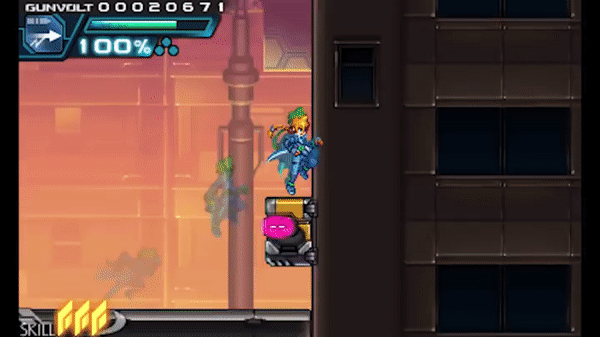
Multi-layered Gameplay
In order to have new users be able to beat the game, we lowered the difficulty a bit for advanced players, they can play things more on the edge with risky, assertive gameplay in order to hear Lumen sing and rack up a bunch of Kudos, thus creating a wide range of layers to the gameplay for our players to enjoy.
But, if we’re gonna talk layers of gameplay, we should definitely talk about the “revival” system we implemented.
In this game, when Gunvolt is defeated in battle there is a small chance that the heroine of the story, Lumen, will use her powers to not only revive Gunvolt, but also to power up his abilities beyond their normal limits. I’m sure you’ve seen this in anime before, the hero is in a pinch, and the heroine sweeps in and turns the tables back in their favor with her awesome power!
We totally wanted to have that situation happen in the game, so we went forward with implementing it.
You are by no means guaranteed to be revived upon getting defeated but by getting closer with Joule/Lumen, you can slightly up your chances of it happening. The element of luck is quite real!
On the other side of the coin, we also implemented some things designed with skilled players in mind. The most efficient means for Gunvolt to acquire Kudos is to defeat multiple enemies at once, which earns him things like “Double” and “Triple” bonuses. There is also the “Full Strike” bonus earned by defeating a single enemy with the maximum amount of tags, or the “Air Strike” by defeating an enemy while in mid-air.
When it comes to defeating enemies at the same time, it does not have to be at exactly the same time; there is a little bit of leeway with this.
Since we made some adjustments to allow a little bit of time to pass between busting up enemies and having it still count as defeating them at the same time, it is possible to pull off getting “Triple” and “Air” bonuses at the same if your hand is skilled enough. You can even destroy 4, even 5 enemies at the same if you have the skills!
(Doing this and keeping your Kudos is no easy feat, though!)
In Azure Striker Gunvolt 2, we added some extra new skills with the additions of Dragonsphere and Crashbolt. There’s not much risk that comes with using these skills, but they are still good to as both a damage source and ways to build your score too. They honestly have a wide range of uses, so I hope that you will try them out in all kinds of different situations. (Dragonsphere kinda works like Aegis Reflector, ya know, all technical like!)
Conclusion
Whew, that went on longer than I originally planned, but that should pretty much wrap things up. There’s still a lot of stuff that I didn’t get to showcase here like many of Gunvolt’s special moves, equipment, and more that we are in the process of putting together.
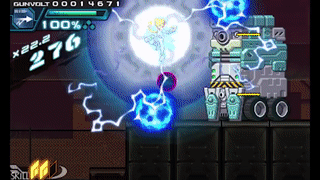
I know I’m repeating myself here, but Gunvolt is a game that we made so that new users could not just enjoy it, but have it serve as a sort of gateway to those who have not really been able to get very far in games like this up until this point. We want to be able to show gamers from all walks of life with all kinds of skill levels just how fun games like this can be.
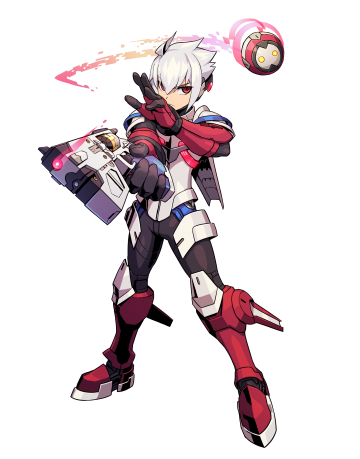
Naturally, we still want our hardcore users to have a lot of fun too, so we have a lot of things in the game for them to enjoy too such as speedrun mode and score attack mode, finding new ways to blaze through stages like a total bad-ass, and last but not least: we love nothing more than seeing players challenge the game in many different ways and we hope that you have a great time doing that.
Next time, we’re gonna dive into the action elements of Copen’s gameplay. See ya then!
The end!
That’s all Inti provided for their design so far! We hope you all enjoyed the read. Let us know what you think and if you’d like to see more!

